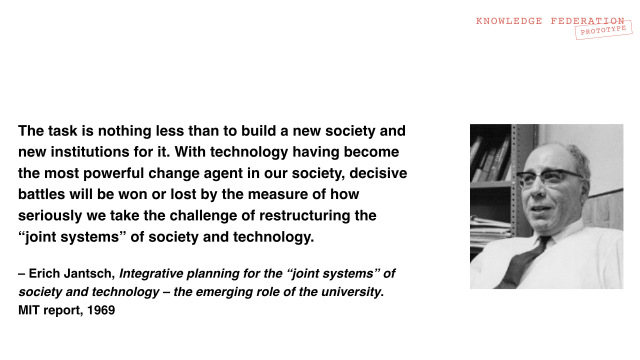Difference between revisions of "Holotopia: Power structure"
m |
m |
||
| Line 35: | Line 35: | ||
<div class="col-md-3"><h2><em>Systemic innovation</em> is the solution</h2></div> | <div class="col-md-3"><h2><em>Systemic innovation</em> is the solution</h2></div> | ||
<div class="col-md-7"><h3>Erich Jantsch's insight</h3> | <div class="col-md-7"><h3>Erich Jantsch's insight</h3> | ||
| − | <p>Having delivered the opening keynote at the inaugural meeting of The Club of Rome, Erich Jantsch clearly saw what needed to be done, if the "problematique" was to be resolved (see it outlined [https://holoscope.info/2019/11/14/knowledge-federation-in-a-nutshell/#Jantsch here]).</p> | + | <p>Having delivered the opening keynote at the inaugural meeting of The Club of Rome, Erich Jantsch clearly saw what needed to be done, if the "problematique" was to be resolved (see it outlined [http://kf.wikiwiki.ifi.uio.no/STORIES#Jantsch here] and [https://holoscope.info/2019/11/14/knowledge-federation-in-a-nutshell/#Jantsch here]).</p> |
<p> | <p> | ||
| Line 53: | Line 53: | ||
</div> </div> | </div> </div> | ||
| − | |||
| − | |||
| − | |||
| − | |||
| − | |||
| − | |||
| − | |||
| − | |||
| − | |||
| − | |||
| − | |||
| − | |||
| − | |||
<div class="row"> | <div class="row"> | ||
| Line 88: | Line 75: | ||
<small>System <em>ideogram</em></small> | <small>System <em>ideogram</em></small> | ||
</p> | </p> | ||
| − | <p>The System <em>ideogram</em> suggests that our institutions or more generally (socio-technical) <em>systems</em>, or the <em>power structures</em>, need to be perceived as gigantic mechanisms; and also <em>handled</em> accordingly (adapted to their purpose). </p> | + | <p>The System <em>ideogram</em> suggests that our institutions or more generally (socio-technical) <em>systems</em>, or the <em>power structures</em>, need to be perceived as gigantic mechanisms, comprising people and technology; and also <em>handled</em> accordingly (adapted to their purpose). </p> |
| − | < | + | <blockquote>The socio-technical systems determine what the results of our work will be. They also form an environment by which our life quality is determined; in which our <em>human quality</em> either grows or decays.</p> |
| + | </div> </div> | ||
| + | <div class="page-header" ><h2>Keywords</h2></div> | ||
| + | <b>To be continued </b> | ||
| − | < | + | <!-- OLD |
| − | |||
<div class="row"> | <div class="row"> | ||
Revision as of 09:46, 1 June 2020
Contents
H O L O T O P I A: F I V E I N S I G H T S
Power structure
Powered by ingenuity of innovation, the Industrial Revolution revolutionized the efficiency of human work. Where could the next change of this kind be coming from?
We look at the systems in which we live and work. Imagine them as gigantic machines, comprising people and technology, whose function is to take people's daily work as input, and turn it into socially useful effects. Incredibly, the ingenuity of our innovation has been focused on small gadgets we can hold in our hand—and we overlooked this far more important frontier.
Power structure wastes resources
The Ferguson–McCandless–Fuller thread is intended to serve as a parable, pointing to the wastefulness of some of our core institutions or systems (finance, and governance tainted by "special interests"). See it outlined on Page 4 of this article, and also here.
This conclusion suggests itself.
We have the resources needed to take care of world's problems. Our root problem is in the structure of our systems—which determine how those resources are distributed and used.
Power structure causes devolution
We chose to use here the keyword power structure, instead of "institutions" or "systems", to point to the reason why we ignored the possibility to adjust the systems in which we live and work to their societal purposes, as the Modernity ideogram suggests we should. The reason is they fulfill an entirely different purpose—they provide a relatively stable environment for our various turf strifes and power battles. We have learned that by complying, we increase our odds of success.
But in this way, the devolution of our system proceeded unhindered, even unnoticed.
The Chomsky–Harari–Graeber thread is intended to serve as another parable. It points to a sobering conclusion: The social-systemic "survival of the fittest" favors aggressive systems, which are damaging to both our culture and ourselves. See it outlined here. Conclude with the reflection on Joel Bakan's "The Corporation", which follows. It will show that although the results of this systemic devolution may look different in our time than they did centuries ago, their pathological character has remained unchanged.
Systemic innovation is the solution
Erich Jantsch's insight
Having delivered the opening keynote at the inaugural meeting of The Club of Rome, Erich Jantsch clearly saw what needed to be done, if the "problematique" was to be resolved (see it outlined here and here).
Our society needs a new capability—to update the systems in which we live and work. Jantsch called it "systemic innovation", and we adopted from him this keyword.
We let Jantsch be the symbol of a missing link between two bodies of work and lines of interest: cybernetics or the systems sciences, and the need to make our civilization "sustainable". In the present holotopiaprototype, those interests are symbolized respectively by Norbert Wiener and Aurelio Peccei.

